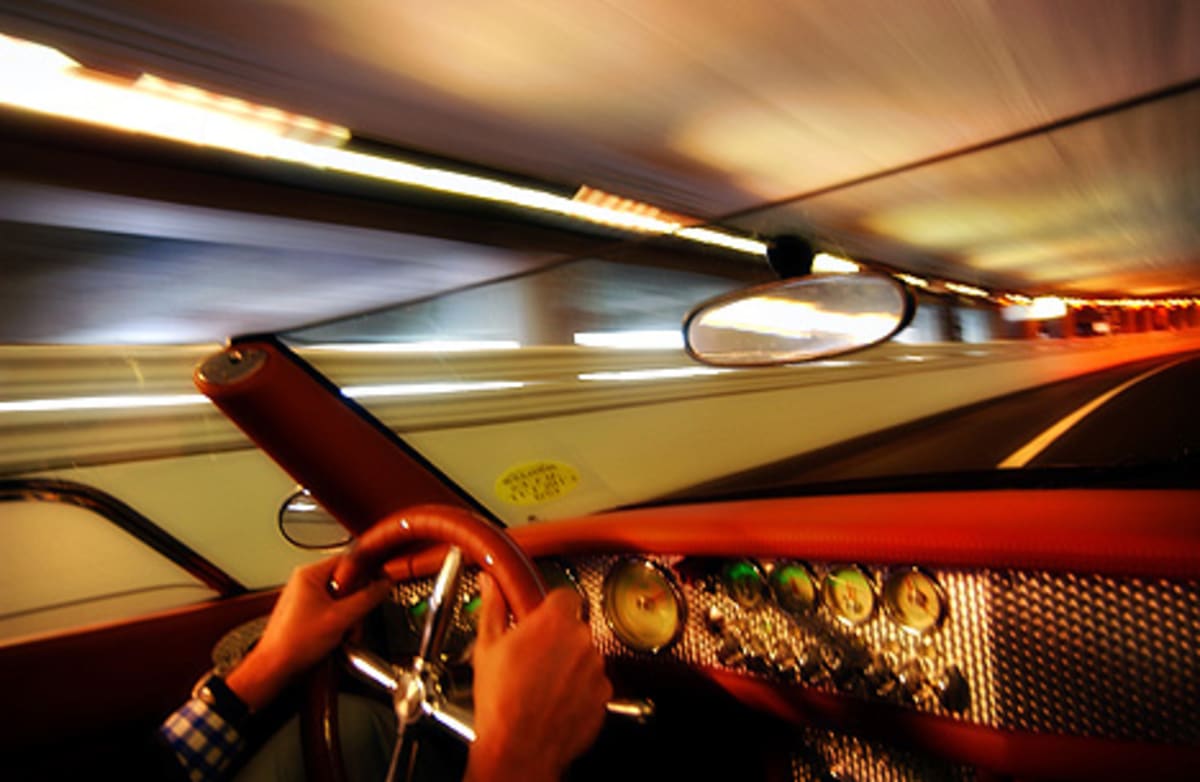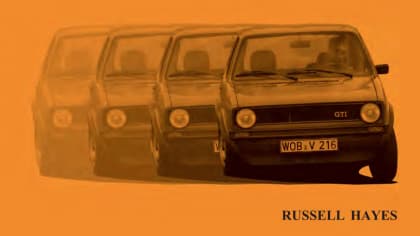BASIC INSTINCTS
This article is from our archives and has not been updated and integrated with our "new" site yet... Even so, it's still awesome - so keep reading!
Published on Sat, Jan 6, 2007
By: The LACar Editorial Staff

BACK TO BASICS
By LAURA BURSTEIN and JOHN GRAFMAN

In every corner of the world, the name Ferrari is understood. Italian exotics are deeply entrenched in the history of the automobile. American and Japanese sports cars also have rich histories, but Zeewolde, Holland and Spyker? Hardly the automotive hot spot, as we know it from our perspective in America, but the Spyker brand is looking to change that.
Similar to several other automotive companies, the company's background shares an involvement in aircraft development. Spyker capitalizes on this relationship and the design of the C8 reflects the heritage.

In brief, the company was originally founded in 1898 by two brothers in Amsterdam. Due to circumstances beyond the brothers control in 1914 (namely WW1), they merged the company with Dutch Aircraft Factory N.V. and the logo promptly changed. The propeller and wire wheel logo reflects the history to this day. Since the merger, the company adopted the mantra that speaks volumes, "For the tenacious no road is impassable." Eleven years later, the company stopped trading, only to be reborn with the debut at the British Motor Show in 2000 with the C8. - Grafman
Burstein: I've been following the car ever since the summer of 2005, when I first laid eyes on it at the Pebble Beach Concours d'Elegance.

There's a certain inapproachability to the roadster; its polished chrome air intakes, scissor doors, and ornate interior - from the myriad switches and buttons to the quilted leather interior - can be intimidating to the ordinary onlooker. And (at least for a while), the folks at Spyker didn't work too hard to shatter this super-elite, too-good-for-real-people perception. At the aforementioned visit to Pebble Beach, the car was corralled off, forbidden to be touched by human hands. But no velvet rope could restrain my emotions - I was in love.
Nearly half a year later, I found the car again at the January 2006 L.A. Auto Show. This time, the stand (which would later be closed off to the public) was open to the press. But the C8 still sat, for the most part, undisturbed. I was able to climb into the cockpit. Up close, I was even more fascinated by the luxurious, detail-oriented interior. The exposed gear linkage was truly delightful, and the propeller effigies on the steering wheel and on each air vent added a vintage aviation feel. I put in the clutch and rowed through the gears, wondering what it would be like to feel this vehicle in motion.

Grafman: Spend some time delving into the design and try not to be wowed. It can't be done. Each aspect of the C8 Spyder is unique. From the little details, like highly finished metalwork in the engine compartment that few will ever lay eyes on, to the foot well - which is crafted with as much care as the door panels. The polished aluminum intake ports and side mirrors glisten. The rivets express a time before robotic welding, and provide the flavor to this treat from the Netherlands.
The history trip continues once the Audi-sourced engine is fired up. In our briefing, we learn that in spite of having a whooping 400 horses charging from the rear wheels, there is no electronic assist like traction control to keep us out of the weeds if we get a little out of control, just like the good ol' days. In a reversal of modern thinking in production cars, the C8 eliminates all power assists that interfere with a direct connection to the functionality of the product. ABS is provided, however, as a concession to safety. This is a physical car. As the C8 Spyder is a lightweight at 2,750 pounds due to its extensive use of aluminum, none of controls are unmanageable, yet one could call this a man's car.

Burstein: Fast forward to December 2006 at O'Gara Coach in Beverly Hills. The night before, we attended a cocktail reception, where Ketel One martinis flowed freely (I even taught the bartender how to make a Vesper), and attendees lounged languidly on the wide sills of open-door C8s. What's more, one of the cars from the newly-renamed Spyker F1 team was on display - sans engine and steering wheel.
On driving day, Vice President of Sales and Marketing for Spyker, Carsten Priesz, hand-delivered a hot chocolate that he'd prepared himself in the break room at O'Gara and answered my questions attentively as he went over the finer details of the Dutch-made machine. It strikes me that I've come a long way from the girl who'd practically pressed her nose against the glass of the Spyker dealership in the years past. On second thought, maybe not. I still felt like a kid in a candy store.

Our "professional" driver, Vinnie, drives the C8 out to the Palisades. The chortle of the engine is powerful and loud. The car is a magnet; it evoked looks of awe and envy everywhere we go.
When it's my turn to drive, I approach with caution and respect. In my first attempt to get the car going, I let out the clutch ever so slowly and gently squeeze on the throttle. Sputter...lurch...thud. I stall. Okay, time for a change of tactic. I throw the car into gear and hit the throttle more aggressively, while letting up on the clutch with confidence and speed. Mm-hmm. This car liked to play rough.

We wind our way through Temescal Canyon, passing unsuspecting lollygaggers lacking lane discipline on the right, and braking when the traffic is unavoidable. As impeccably proper as the car looks, it exudes a somewhat raw, rebellious quality at speed. And with no driver aids, it's clear that this is a motorsports enthusiast's machine.
Grafman: I get the car into gear easily enough. The shifter does look like some heavy metal part from day's gone by, but the shifter works well, with a firm direct input on the driver's part. The clutch, on the other hand, is a bit heavy. At long stop signal lights, plan on sticking the car into neutral - unless you are looking to build the calf muscles in your left leg (perfect for burgeoning soccer stars).

Unlike the clutch, there is no problem depressing the accelerator. As light as this car is, the car can squirt through traffic like a formula race car. Numbers like 0-60 in 4.5 seconds, and top speed of 187 mph speak volumes as to the cars potential. Similar to the Audi RS4, the C8 has a switch to change the exhaust note via the baffling in the exhaust system. With the top down on PCH, the roar is undeniably gratifying. A side benefit: Neighboring cars that might not see you coming should be able to hear you - shades of Harley.
I personally will like to have a bit more differentiation in the numerous gauges on the instrument panel. A quick glance isn't enough to locate the information I need, especially since the topography of the dash and instrument panel doesn't provide enough variation to allow an instantaneous visual reference. And don't even try to find the audio system, there isn't one. The note from the motor is so pure residing just behind the occupants, who needs anything more?

One awkward element that sticks out is the steering wheel. While having a column tilt, the wheel doesn't adjust very far down. The gap between the wheel and my thigh is abnormal to put it mildly, and the wheel isn't as comfortable as it could by virtue of the height. I suppose, however, this car is ideal for many an NBA, or NFL player. For those lucky few, they might need all the space they can get.
Burstein: After my rather conservative drive had come to an end, Vinnie and I swap seats. Upon takeoff, the quick acceleration leaves me breathless; I fell my body float off the seat and my toes become numb - a sensation normally only felt during ride-alongs at Laguna Seca. Vinnie admits that this somewhat vigorous exercise is a tad more spirited than the normal ride-and-drives he conducts with other passengers. When I'm able to stop giggling from the butterflies in my stomach, I realize the car fells much safer than I expect. Despite the lack of traction or stability control, the car minds its manners. Braking is responsive but not jerky, and on turns, the back end felt dynamic yet in control, without suffering from any wimpy understeer.

All-in-all, the car lives up to its near-mythical reputation. I'm only sad I don't get a bit more drive time. But, considering my long, arduous road to the driver's seat, I'm not going to push my luck.
Grafman: Now for the $64,000 question: How much does this set one back? Essentially, the C8 Spyder is bordering on $300,000 when you factor in tax, license and so forth. So the big question is who buys this. Well, in the California neighborhoods that sell Spykers, Beverly Hills, Newport Beach, and San Diego, this is instant relief from the default option, the run-of-the-mill exotics.

SUMMARY JUDGMENT
This might just be the next best export out of Holland since the windmill - the Spyker just spins a bit faster!
For more information please go to www.spykercars.com

SPECIFICATIONS
Price: $269,995, as tested $296,785
Engine type: 4.2-liter, all aluminum, four OHC, eight-cylinder engine, 5 valves per cylinder
Horsepower: 400
Drive configuration: Mid engine/rear drive
Gas mileage: EPA 14 city, 19 highway




